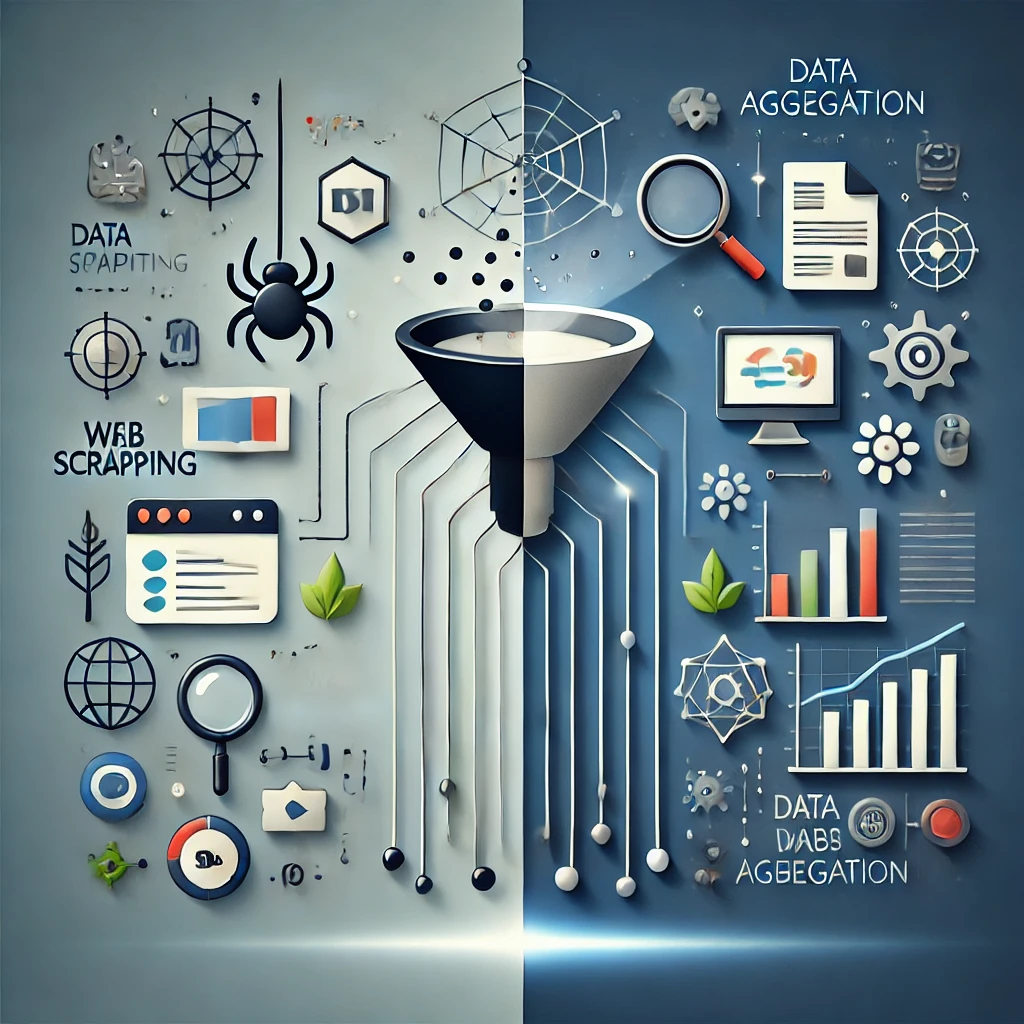In today’s data-driven world, businesses are constantly seeking ways to gather, process, and utilize information effectively. Two key techniques—web scraping and data aggregation—are essential in this process. While the terms are often used together, they represent distinct functions that work in tandem to turn raw information into actionable insights.
This article explores the differences between data aggregation and web scraping, how they complement each other, and why they are vital for modern businesses.
What Is Web Scraping?
Web scraping is the automated process of extracting information from websites. This technology enables businesses to collect large amounts of data quickly and efficiently. Common use cases for web scraping include:
- Monitoring competitor pricing and inventory in e-commerce.
- Collecting customer reviews for sentiment analysis.
- Tracking industry trends or market activities.
Essentially, web scraping gathers raw, unstructured data from online sources. However, this data is not immediately ready for analysis—it often requires further processing to make it useful. That’s where data aggregation comes into play.
What Is Data Aggregation?
Data aggregation refers to the process of consolidating and organizing data from multiple sources into a single, structured dataset. It transforms scattered information into a cohesive format that is ready for analysis and decision-making.
For example, if a business uses web scraping to collect product prices from several competitors, data aggregation organizes this information to reveal pricing trends, market averages, or seasonal fluctuations. Aggregation isn’t limited to web scraping—it can also incorporate data from APIs, internal databases, or offline sources.
The primary goal of data aggregation is to provide a clear, comprehensive view of the information, making it easier to draw insights and make informed decisions.
Key Differences Between Web Scraping and Data Aggregation
Although web scraping and data aggregation are closely related, they serve distinct purposes:
AspectWeb ScrapingData AggregationPurposeCollects raw data from websites.Consolidates and organizes data.FocusGathering information.Structuring and summarizing information.ScopePrimarily online sources.Online and offline sources.OutputRaw, unprocessed data.Cleaned, actionable datasets.
Combining the two processes creates a seamless workflow for gathering and analyzing information.
Why These Processes Matter
The synergy between web scraping and data aggregation is critical for businesses that want to stay competitive in today’s fast-paced market. Here are some reasons why they matter:
- Market Analysis
Web scraping gathers the raw data needed to monitor market trends, while data aggregation organizes it into a format that highlights patterns and insights. - Informed Decision-Making
Aggregated data helps businesses make decisions more confidently, whether it’s optimizing pricing strategies or tailoring marketing campaigns. - Efficiency and Accuracy
Automation through web scraping and aggregation reduces manual effort and ensures data accuracy, saving businesses time and resources. - Scalability
As businesses grow, so do their data needs. These processes scale easily, accommodating larger datasets and more complex analysis requirements.
Leveraging Custom Solutions
While generic web scraping and aggregation tools exist, businesses often require tailored solutions to address their unique challenges. Custom platforms provide the flexibility to:
- Focus on collecting and structuring the most relevant data.
- Integrate seamlessly with existing systems.
- Handle complex datasets and industry-specific requirements.
GroupBWT specializes in creating custom web scraping and data aggregation solutions designed to meet the specific needs of businesses. By automating these processes, companies can efficiently turn raw data into actionable insights without the limitations of off-the-shelf tools.
Final Thoughts
Web scraping and data aggregation are complementary processes that form the backbone of effective data utilization. While web scraping collects valuable information, data aggregation refines it into a resource that businesses can use to drive strategy and innovation.
For businesses looking to streamline these processes, investing in custom solutions can make all the difference. Companies like GroupBWT offer tailored tools that empower businesses to not only gather data but also harness its full potential for growth and success. Whether you’re monitoring market trends or enhancing customer insights, these tools are invaluable in a data-driven world.
